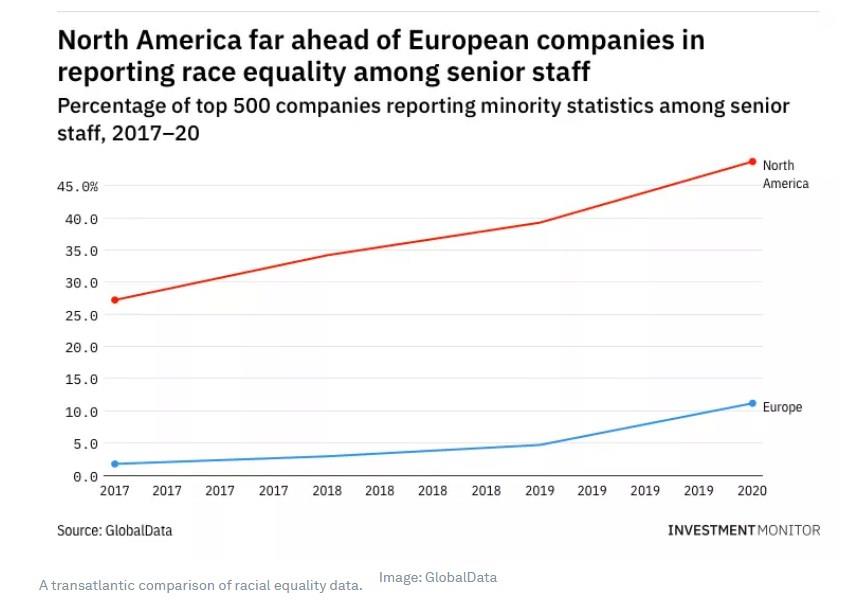by Kimberly Bennett and Amy Goldman*
Two years ago, this 25 May, the murder of George Floyd – an unarmed Black man killed by a police officer in Minneapolis – sparked a global reckoning and movement for racial justice in multiple sectors, including business. More than 60 organizations across 13 industries with more than 5.5 million employees worldwide have since committed to building more equitable and just workplaces as part of the Partnering for Racial Justice in Business initiative – a global coalition led by the World Economic Forum. Now, keeping momentum needs action amid other priorities, such as COVID-19 and the war in Ukraine, vying for our attention.
Rewiring an unequal society is a herculean task, however, as the marginalization and discrimination of people of colour is a deeply systemic challenge that white-dominated culture has upheld for centuries. We can, however, draw inspiration from signatories of the Partnering for Racial Justice in Business initiative. They are exploring new ways to improve racial and ethnic inclusivity inside and outside of workplaces. Their work highlights three factors other businesses should consider.
How businesses can achieve racial equity
1. Look within first
The quest for racial equity and social justice is not a zero-sum game but a story of all of our humanity. Everyone has a part in bringing about change and for businesses and their staff, this must start with the difficult practice of introspection and honesty before they can exact outward change. Such inward-looking could take place through a racial equity audit.
Several Fortune 500 and S&P 200 companies, including JP Morgan Chase and the Citibank Group, have engaged independent third parties to conduct internal racial equity audits to diagnose the problem before they treat it and to ensure that what they are saying about racial equity aligns with what they are doing.

This approach is a potentially powerful action-orientated accountability tool that builds trust with customers.
“What gets measured gets done,” says Buks Akinseye, Deputy Equality, Diversity & Inclusion Manager at Ingka Group, the largest IKEA retailer with over 174,000 employees in 32 countries. “You can entrench the power of inclusion when you measure diversity.”
Ingka Group launched a voluntary and anonymous diversity and inclusion survey to gather data and set the baseline for diverse representation, identifying differences in workplace experiences and measuring the progress made. In the EU, this exercise is complicated because definitions of racialized groups are inconsistent across the bloc, while EU privacy laws can be a barrier to obtaining data. This complexity highlights the systemic nature of injustice and inequality and that there is no one-size-fits-all approach, a reality Akinseye says the Ingka Group has to approach with humility, recognizing a nuanced and collective approach is needed for progress.
2. Recognize shared responsibility
Introspection is fundamental to changing hearts and minds and thus holding conscious conversations on race and racism. However, such consciousness is only the beginning and organizations and individuals must work with others for a wider impact.
PepsiCo, a company recognized as a diversity leader since the 1940s, also emphasizes the power of partnerships in advancing equity. According to Tina Bigalke, PepsiCo’s Chief Diversity, Equity and Inclusion Officer, the corporation has doubled down on efforts to address systemic barriers to racial equity through a holistic approach and create opportunities for communities of colour. It has set up, for example, a multicultural business unit focused on business and equity development and launched a racial equality journey initiative with specific commitments and funding across people, business and community.
“We recognize that PepsiCo cannot move the needle of racial equity alone. To move from commitment to action, we need everyone to join in across industry, working with our peers, working with civil society, working with communities,” says Bigalke.
She explains that when it comes to their business pillar, they have partnered with organizations, such as the National Urban League, UNIDOS and other community organizations to support BIPOC-owned businesses in the United States more effectively. “While we can use our scale and our influence, these organizations are best placed to help us understand and identify who needs that support.”
3. Listen to those at the sharp end of harms
PepsiCo’s approach also demonstrates the importance of listening to communities businesses serve to understand better how systemic barriers thwart racial equity. By consciously engaging those historically marginalized and underserved, new and transformative solutions emerge that often benefit everyone, including the organization.
This same conviction underpins the work of Mayo Clinic, which exercises its influence to address health disparities, eliminate racism and advance equity and inclusion on its campuses by reaching out to its patients, staff, learners and communities. According to Dr. Anjali Bhagra, Professor of Medicine, Office of Equity, Inclusion and Diversity, Mayo Clinic, efforts include:
- Investment in health disparities research.
- A clinic for transgender and intersex patients.
- Improvement in rates of colorectal screening and diabetes control in minority populations.
- A diversity curricula across schools in the Mayo Clinic College of Medicine for better cultural competence and representation in the next generation of health care workers.
“Within the workplace itself, one of our key challenges is hearing diverse voices: Employees from diverse backgrounds and lives don’t always see or hear their voices in diversity, equity, and inclusion activities. We need to work to help people identify themselves in programming that may be perceived to be focused on certain groups,” says Dr. Bhagra.
Businesses are key to the solution
The work of Mayo Clinic, PepsiCo and Ingka Group are just three examples of what is possible when a business approaches the challenge of racial equity with intention and innovation. Businesses on their own cannot solve racial inequity but they can be a significant force for change and key to the solution, acting as change agents within communities and pursuing joint actions with government and civil society to strengthen systemic-level reforms.
Eradicating racism needs an all-hands approach and businesses’ role is to deliver beyond pledges and promises through collective action. Industry leaders are already Partnering for Racial Justice in Business – join them on this shared journey.
*Lead, Racial Justice in Business, World Economic Forum and Chief Executive Officer and Chair, GHR Foundation
**first published in: www.weforum.org




 By: N. Peter Kramer
By: N. Peter Kramer
